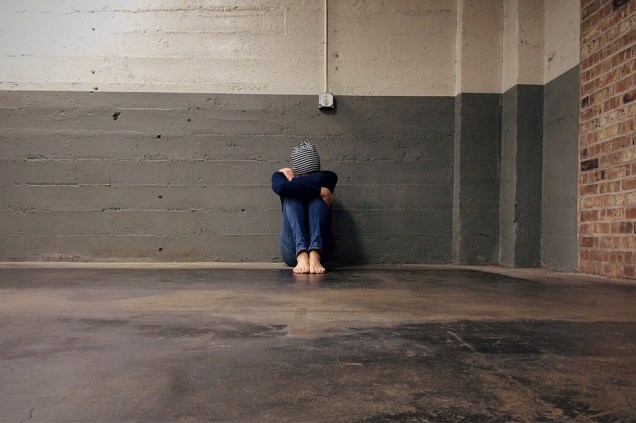
CC image courtesy of Pixabay, Wokandapix.
Trigger Warning: Discussions of emotional abuse, and descriptions of suicide and suicidal ideation.
Some stories here have recounted the experiences of people who were abused by sadistic parents or brought up in a cult. My own homeschooling narrative is much less severe. There was never any physical or sexual abuse. Religion was not used as a tool to dominate me. What adversity I faced mostly involved being homeschooled for five years by my emotionally unstable mother. She had grown up in poverty and never graduated from college, yet grasped on to homeschooling as a way to join a community and gain some meaning for her isolated life.
My mother wasn’t an evil person.
She and her older sister were raised in a series of apartment complexes by their severely depressed and emotionally abusive alcoholic single mother (my scumbag grandfather had abandoned them to start a new family). Her childhood was unstable, with several new step-fathers coming and going, and one serious suicide attempt by my grandmother. It was in her teenage years that my mother began her history of suicide attempts.
Desperate to leave her broken home, she completed her GED around ages 15-16, and went on to college, where at age 17 she met my father. They married immediately after her 18th birthday. He was several years older than her and not particularly bright or emotionally mature, but he offered the opportunity to escape life with her mother.
Predictably, marriage did not solve her problems.
My parents had totally different personalities and values, and spent the majority of their 20 years of marriage repeating the same fights over and over. But no matter how bad things got, she never considered divorce because their marriage was all she had. She was an emotional dependent.
At age 21 my mother had a stroke after mixing some medication with alcohol, and developed Tourettes syndrome. Crippling anxiety consumed her soon after, isolating her further. The suicide attempts of her adolescence resumed in her mid-20s.
After nine years of marriage I was finally conceived. My mother believed parenthood would be the solution to her problems. For the first three to four years, she seemed to have enjoyed parenting. But by age five I started to become too headstrong for her to manage easily.
My parents constantly disagreed over disciplinary measures.
This led to frequent fights. My father disagreed with her strict parenting. My mother was frustrated over his lack of any real involvement or contribution to parenting beyond criticizing her. After one argument (I must have been seven or eight) she said she was done and left. She came back the next morning.
Anxiety over her Tourettes syndrome finally began to break my mother and she quit her job to start parenting full-time. My younger sister was born almost five years after me. Mom started homeschooling my sister after her fifth birthday. That same year, just starting the 4th grade, I was pulled out of the private catholic school I attended (we were poor, but my paternal grandparents were willing to pay for my tuition). One of the students had ‘stabbed’ (probably poked) another with a pencil and a few mothers,
including mine, overreacted by pulling their children out of the school.
The next five years were hell for both of us.
For the first month I wasn’t taught anything. Eventually my mother began to meet and befriend other homeschooling parents, bought several christian textbooks, and put me and my sister into a co-op.
For the majority of my homeschooling education, character building and disciplining took precedence over any actual learning. Lessons were frequently interrupted because she didn’t like a particular tone of voice I used, or because I looked exasperated.
I had developed sleep apnea as a child due to a deviated septum and recessed lower jaw (I had needed braces for an overbite, which my mother decided against getting me). As a result by age ten I began to experience sleep deprivation and social anxiety. Every morning I would wake up and begin my lessons while dealing with congestion and headaches. As you would expect, children with sleep-deficits can be very irritable, and my mother and I began to bicker constantly.
My mother wasn’t perceptive enough to recognize these underlying issues, and instead assumed my problems stemmed from seasonal allergies and personality defects like obstinance or lack of motivation.
She referred to any display of irritability as ‘attitude’ for which I received consistently ineffectual punishments (spanking, grounding, loss of privileges). Unable to deter me from what she saw as misbehavior, we often fought until lessons for the day could no longer continue and I had to be sent to my room and grounded.
One time she took away my ‘TV privileges’ for a week after I failed to comply with her demand that I suppress any ‘attitude’ during a lesson. I was still unable to hide my aggravation (meaning my face had an angry expression), and after a couple more bitter exchanges I was banned from watching any TV for a full year.
Sometimes my father tried to negotiate down whatever punishment she had decided on.
But he had never wanted children, and expected my mother to perform all child-rearing duties. At the same time he constantly disagreed with her approach to parenting. Her personality was always much stronger than his, so she usually won these arguments. Neither of them had any communication skills, and they were never able to come to any kind of mutual understanding. These were two people who never should have married, let alone had children.
At age eleven I began to experience suicidal ideation, and openly expressed my desire to kill myself. My mother brought a friend from church to pray over me, but the issue was kept quiet after that and never addressed.
Our hostilities rapidly increased during the last two years of her life.
She developed a tolerance for the antidepressants she had been taking, and became an emotional wreck as a result. We tried to avoid each other as much as possible. From this point on (ages 12-14) I was expected to assume responsibility for my own education, while she would infrequently check how far I had progressed into my mathematics workbook. To avoid having to deal with me too often, she placed me in various athletic and religious programs (including the boy scouts) which filled my schedule for most of the week. Our mutual disposition toward one another remained icy.
Near the end of her life she began to rely on humiliation as a tool to discipline me.
In one instance I was made to attend my swim practice (an instructor offered lessons at a local community center) but sit outside the pool for the duration of the class, a consequence for my having disrespected her in some way. Another time she tried to shame me for my recalcitrant attitude by involving my friend’s parents in my disciplining. As with the ban on TV, none of these punishments were ever effective and only worsened our relationship. Her failure to find an effective way to discipline me only increased her frustration.
She eventually discovered that she could exert a measure of control over me by threatening to place me into a public school. I had become incredibly shy, even compared to many of my other homeschooled peers, and she would often deride me for this. It is probably the greatest shame I hold as a homeschooler that I was terrified at the thought of being sent to a public school and having all of my shortcomings (educational, social, physical) exposed to my more secular peers. But she never attempted to carry out any of these threats.
Another serious contributor to our inability to get along was her belief in the obligation of a child to provide emotional support for her/his parents.
She expected me to be a loyal, loving son and friend. She wanted me to be generous, selfless, and religiously devout. Failing to display these qualities invited her frustration and scorn. Instead of meeting her expectations I often displayed a childish selfishness which reminded her of my grandmother.
I wasn’t surprised to learn in recent years that my mother’s emotional dependence on her children paralleled her own relationship with my grandmother. Mom was able to fulfill the role of supportive daughter to my grandmother, and she expected me to serve her in the same duty. In her eyes my inability to do so reflected my poor character.
She became more explosive and vindictive during her final months, and my father asked me if I wanted them to get a divorce.
I said yes. Unfortunately shortly thereafter my mother’s mental state reached a point where divorce was no longer an option. One day she told me she had had enough and left. She was hospitalized later that night after driving into a tree. She came back from the hospital and told me I had “one more chance”. She was often cryptic like this, and it wasn’t until after her death that I came to realize she had been threatening me with her
suicide for months before she finally succeeded in going through with it.
As was inevitable, I spoke or acted out in someway that offended her, and so she ceased speaking with me for the last few weeks of her life (she did continue educating my younger sibling during this time). One day after her 41st birthday she left the house to make her final suicide attempt, a drug overdose.
Her comatose body was eventually recovered from a distant park.
As she lay in the hospital I remember praying to God, begging him to end her life. I hated her completely. On Sunday, our pastor asked the entire congregation to pray for my mother’s recovery. The following Tuesday, she finally perished after two weeks in a coma. I had only recently turned 14.
Her control over my education finally ended after five years, during which time I had received little to no science, geography, language, or history education. What I was lucky enough to get consisted of badly taught christian math lessons from VHS tapes + worksheets and the literature I was allowed to read while confined to my room.
For several years the gaps in my education had been visible to many in the community.
Most of my other homeschooled friends and their parents had noted and even joked about my ignorance. Little was done about it, no one in the community had suggested my mother give up homeschooling. To them it was a religious vocation, primarily centered on an evangelical moral education. Since in their eyes I was a ‘good christian’ and relatively well-adjusted, my mother must have been performing her duties sufficiently. I suspect she was aware of her failings as an educator, and this likely reinforced her resolve to commit suicide.
Because of the circumstances of her death, I received little to no support.
No one in the homeschooling community ever acknowledged the cause of her death. My mother’s family (grandmother aunt, cousins) never admitted to her flaws or the harm she did, causing a rift between us. My father’s family were all too preoccupied with their own problems to have any involvement in my life. My widowed father coped by becoming a drug addict.
Mom’s suicide spurred my rapid exit from Christianity. I was an atheist by the end of the year (this was in the mid-2000s when atheism dominated the internet). During this time I lost every friend I had. Most of the people I knew in the homeschooling community disappeared because I left fundamentalist christianity. I compulsively severed relationships with all of my closest friends due to the trauma, shame and isolation I felt over my mother’s suicide. Insecurities relating to my physical appearance, lack of social skills, and failed education also contributed to my sense of alienation. Isolating myself offered me the only sense of control I had ever felt over my own life. There was some irony to this, since my mother’s death had already basically emancipated me from any adult supervision/parenting/guidance.
Somehow I was allowed by my relatives to ‘homeschool’ myself for nearly a year before my local I.S.D. finally discovered my existence and sent someone to my house.
Eventually I was enrolled into the nearest highschool where I was able to complete my diploma. Unfortunately this was an inner-city school, and I was passed through without being adequately prepared for college. During that time I slept 14 hours a day and was too emotionally damaged to form relationships with other people or think seriously about my future.
I enrolled in a local community college with no clear idea of what I wanted to do, or even whether I wanted to go on living. By some fluke I was able to score just high enough on the SAT to avoid the need for remedial classes, despite having been too dysfunctional to do any studying.
It was in college that I discovered just how incomplete my education had been.
I was unaware of several basic rules of algebra and barely passed my math courses (I even had to drop a STEM mathematics course for one less rigorous). My science education suffered immensely as a result. A STEM major was out of the question and I realized I would need to switch to a liberal arts degree to maintain an acceptable GPA. I took summer classes and quickly completed my college degree plan, moving on to university as severely depressed agoraphobe who still had no real purpose or direction in his life.
My depression, traumatic stress, physical insecurities, and previously mentioned sleeping issues eventually became too much for me to bear. I dropped out of university and became trapped in a cycle of depression and suicide attempts for the next 5 years. I am now in my mid-20s with no degree or job.
Reading the other stories here I’ve come to realize how lucky I was.
My parents were only moderately pious by comparison to most of the other homeschooling families I grew up around. I was spared any sexual or physical abuse. Because my mother took her own life I was at least able to acquire a diploma and be freed of her psychological abuse. I have also had plenty of emotional support from my younger sibling, who has gone on to have a meaningful life. Out of guilt my father allowed me to live at home for these past few years, so homelessness was never a risk.
My mother was not mentally fit to be a competent parent, let alone homeschool her children. But thanks to the activism of predominantly wealthy, suburban parents, often organized around ultraconservative religious ideologies, the state I live in (Texas) offers zero oversight to homeschoolers.
It is exactly that oversight which could have protected parents like mine from themselves and guaranteed their children the right to an education.
Had some government mechanism existed to check my educational progress, my mother might have been deterred from taking up homeschooling. This may not have solved all of my problems, but without a doubt it would have immeasurably improved my life today.


